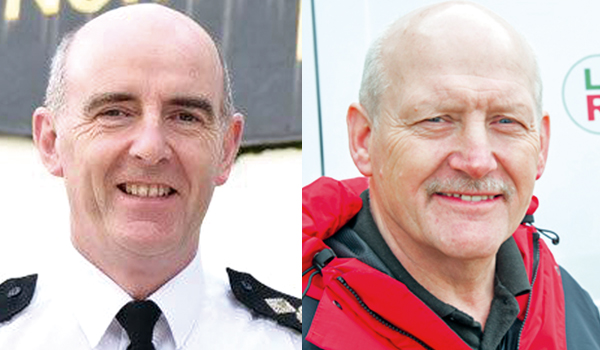The lowdown on SAR
Gareth Pritchard and Paul Lewis discuss the advancements in search and rescue in support of policing and the emergency services.
Much has changed in search and rescue (SAR) over the past few years. A far more professional approach is now adopted in UK SAR and by the volunteers who dedicate their time and efforts in support of emergency services and their local resilience forum. Nationally, there have been two significant changes. Firstly, the loss of RAF airborne search and rescue capability, which was privatised and the contract given to Bristow. This has led to the purchase of 18 new helicopters eight Augusta Westland AW192 and ten Sikorsky S92 in ten bases across the country. The RAF had historically been a major player in SAR and the withdrawal of the Armed Forces from this facet of operations brought on significant change. The handover to the Bristow fleet has been undertaken effectively, but the new airframes have required significant additional training for the volunteers across the country. The second major change was the transfer of the Aeronautical Resource Coordination Centre (ARCC) from RAF Kinloss to the National Maritime Operations Centre (NMOC), under the Maritime Coastguard Agency (MCA) in Fareham. The police are the coordinating agency for SAR on land while the MCA coordinates at sea and on the coast. However, the transfer of the ARCC to the NMOC has led to the MCA coordinating the air response for land-based searches. The schematic demonstrates the various roles that different bodies and volunteers groups have in the SAR framework in the UK. Within land SAR, a number of groups now work together to provide comprehensive cover across the UK. The map on the following page shows the areas covered by various SAR teams across the UK. Within England and Wales, the SAR framework focuses heavily on three volunteer bodies Mountain Rescue England and Wales (MREW), Association of Lowland Search and Rescue (ALSAR) and British Cave Rescue Council (BCRC). Teams Volunteers MREW 48 3,000 ALSAR 36 1,500 BCRC 15 1,000 Mountain rescue teams are well known and have a long and proud tradition of working with emergency services to support and rescue those in distress in the mountains. Likewise, Cave Rescue has integrated very well with MREW and provides specialist support. In more recent times, the ALSAR teams have developed significantly. The volunteer community has also come to the assistance of emergency services with regard to flooding. The work of volunteers was evident in the water rescues that were undertaken in the flooding in Cumbria and Yorkshire during the Christmas of 2015. The volunteer community has become a critically essential asset to local resilience forums and we know their support is greatly appreciated. Lowland Rescue units are individual charities formed, with some local exceptions, to serve individual police forces and provide expertise in search planning, management and the supply of on-the-ground resources. Every force is now dealing with far more incidents of missing persons, concerns for safety and concern for welfare. This has led to a significant increase in searches in the urban environment for individuals who may be distressed, disorientated or suffering from mental health issues. Lowland Rescue has more than 1,500 members across the UK and is on call to respond with robust and sustainable communications, scalable deployment capabilities and specialist resources, including search dogs, drones, water-search and 4×4 vehicles for when high-risk missing persons need locating. What is evident is that the most successful relationships are those which are supported by senior ranks, facilitating close working and shared resources at all levels. When thought of as more than just a tool to use somewhere down the line in an investigation, well-embraced Lowland Rescue units are saving lives and reducing the need for search-trained officer deployments and helicopter deployments. By calling teams out early as part of the frontline resource with access to information and trusted to form a search plan, Lowland Rescue search managers have been proven to make a difference to


